ЛОГІКА, МУЗИКА ТА РИТОРИКА ЯК ЗАСІБ ФОРМУВАННЯ ОСОБИСТОСТІ ТА ЇЇ ЖИТТЄДІЯЛЬНОСТІ В УМОВАХ СУЧАСНИХ СОЦІАЛЬНО-КУЛЬТУРНИХ ТРАНСФОРМАЦІЙ
DOI:
https://doi.org/10.32782/facs-2025-3-2-29Ключові слова:
особистість, логіка, музика, риторика, інформаційне суспільство, креативність, музична риторикаАнотація
Метою статті є аналіз використання логіки, риторики та музики, як засобів формування сучасної особистості, її компетенцій, навичок, поведінки у сучасному соціокультурному просторі, формуванні громадської думки, вплив на соціальні процеси у сучасному світі.Методологія. Досягнення поставленої мети передбачає використання загальнонаукового, аналітичного, порівняльно-історичного методів для дослідження впливу науки логіки на формування особистості. Метод дискурсивного аналізу дав можливість дозволив дослідити риторику в контексті влади, ідеології, впливу на формування думки суспільства, феноменологічний метод – аналіз суб’єктивного досвіду людей у сприйнятті музики й риторичних текстів, аналіз соціальних мереж, дослідження впливу певних музичних та риторичних творів, які поширюються в медіа, на поведінку та реакції суспільства та окремих його членів. Метод контент-аналізу – аналіз текстів пісень, виступів, промов на наявність певних ідей, емоцій, ідеологій, обговорення в групі людей щодо певної музичної чи риторичної теми для аналізу колективної думки. Ці методологічні інструменти дали можливість зрозуміти та простежити механізм впливу логіки, риторики та музику на формування особистості у сучасну добу.Наукова новизна полягає у виявленні нового механізму впливу логіки, музики та риторики на формування нових компетенцій особистості у сучасному суспільстві.Висновки. В умовах сучасних соціально-культурних трансформацій складові «семі вільних мистецтв» – логіка, музика та риторика продовжують відігравати важливу роль у формуванні гармонійної, свідомої та креативної особистості ХХІ ст. Взаємодія цих наук сприяє формуванню у сучасної особистості критичного мислення, емоційного інтелекту, здатності до комунікації, соціальної адаптації та самовираження. Логіка навчає структуровано мислити та аналізувати, риторика – переконувати, аргументувати та впливати на суспільну думку, а музика – глибше пізнавати себе та світ через емоції, символи та культурні коди. У сучасному інформаційному суспільстві, де зростає значення міждисциплінарних підходів, саме синтез логіки, риторики та музики забезпечує ефективне формування життєвих компетенцій особистості та її активну участь у соціокультурних процесах.
Посилання
Беліченко Н. М. Логіка поліфонічного мислення у перспективі музикознавчих студій. Міжнародний вісник: культурологія, філологія, музикознавство. 2017. Вип. 2. С. 101–107.
Блажко Л. Скрябін, пісня про козаків та власні вірші. Найкращі композиції, які обирав Усик для виходу на ринг. 21.12.2024. URL: https://www.rbc.ua/rus/styler/skryabin-pisnya-kozakiv-ta-vlasni-virshi-1734799513.html
Бондар Т. І. Логіка в соціально-політичному контексті. Вісник Державної академії керівних кадрів культури і мистецтв. 2011. № 2. С. 3–7.
Будянський Д. В., Друшляк М. Г., Семеніхіна О. В., Харченко І. І., Горбачук В. О., Чашечникова О. С. Типологія електронних ресурсів у формуванні риторичної культури фахівця. Інформаційні технології і засоби навчання. 2021. № 1. С. 82–96.
Дудник Н. Теоретичні засади формування риторичної компетентності майбутніх педагогів у процесі фахової підготовки. Проблеми підготовки сучасного вчителя. 2023. № 1. С. 47–53.
Залюбівська О. Б. Педагогічні засади формування риторичної культури особистості. Вісник Вінницького політехнічного інституту. 2010. № 6. С. 126–132.
Злотник О. Й. Комунікативний простір музичного мистецтва України кінця ХХ – початку ХХІ століття : дис. … канд. мистецтвознавства : 26.00.01 / Нац. акад. кер. кадрів культури і мистецтв. Київ, 2019. 254 с.
Картава Ю. А. Виховний вплив музичного мистецтва на формування особистості дитини. Педагогічні науки: теорія, історія, інноваційні технології. 2015. № 3. С. 274–281.
Касьяненко Л. О. Феномен риторики в ораторському мистецтві та музичному виконавстві. Південноукраїнські мистецькі студії. 2024. № 1. С. 84–92.
Колотілова Н. А. Логіка і риторика в дослідженнях аргументативної проблематики початку ХХІ ст. Гілея : наук. вісн. 2019. Вип. 142 (2). С. 69–72.
Конівіцька Т. Я. Риторичні аспекти діяльності психологів у надзвичайних ситуаціях. Проблеми та перспективи розвитку системи безпеки життєдіяльності : матеріали ХІV Міжнар. наук.-практ. конф. молодих вчених, курсантів та студентів (Львів, 28‒29 берез. 2019 р.). Львів, 2019. С. 383–385.
Корчова О. Структурно-змістові складники риторичної компетентності майбутніх фахівців соціономічної сфери. Педагогічні науки: теорія, історія, інноваційні технології. 2015. № 6. С. 196–206.
Лі Хуйфан. Розвиток музикальності особистості як проблема науково-педагогічного знання. Молодь і ринок. 2020. № 5. С. 151–156.
Мазур Б. М. Сучасне мистецтво як інструмент формування свідомості суспільства. Мистецтвознавчі записки : зб. наук. праць. Київ, 2020. Вип. 37. С. 34–37.
Музика для медитації та релаксації на кожен день. 01.12.2017. URL: https://yogafest.com.ua/uk/muzika-dlya-meditaciyi-ta-relaksaciyi-na-kozhen-den/
Пясковський І. Б. Логічне і художнє в музичному мистецтві. Часопис Національної музичної академії імені П. І. Чайковського. 2009. № 1 (2). С. 21–25.
Радкевич Н. Сильвестров про хоровий цикл «Майдан 2014»: «Це велика кантата, яка закінчується колисковою». 18.11.2021. URL: https://suspilne.media/culture/182032-silvestrov-pro-horovij-cikl-majdan-2014-ce- velika-kantata-aka-zakincuetsa-koliskovou/
Соловей Я. Г. Музика у духовному розвитку особистості. Науковий вісник Мукачівського державного уні- верситету. Серія: Педагогіка та психологія. 2015. Вип. 1. С. 121–125.
Усатий А. В. Формування риторичної культури майбутнього вчителя-словесника. Педагогічна риторика: історія, теорія, практика : монографія / за ред. О. А. Кучерук. Київ, 2016. С. 217–229.
Яворський О. День Державного гімну України: цікаві факти та яскраві виконання. 10.03.2024. URL: https://shotam.info/den-derzhavnoho-himnu-ukrainy-tsikavi-fakty-ta-iaskravi-vykonannia/
##submission.downloads##
Опубліковано
Як цитувати
Номер
Розділ
Ліцензія

Ця робота ліцензується відповідно до Creative Commons Attribution 4.0 International License.







